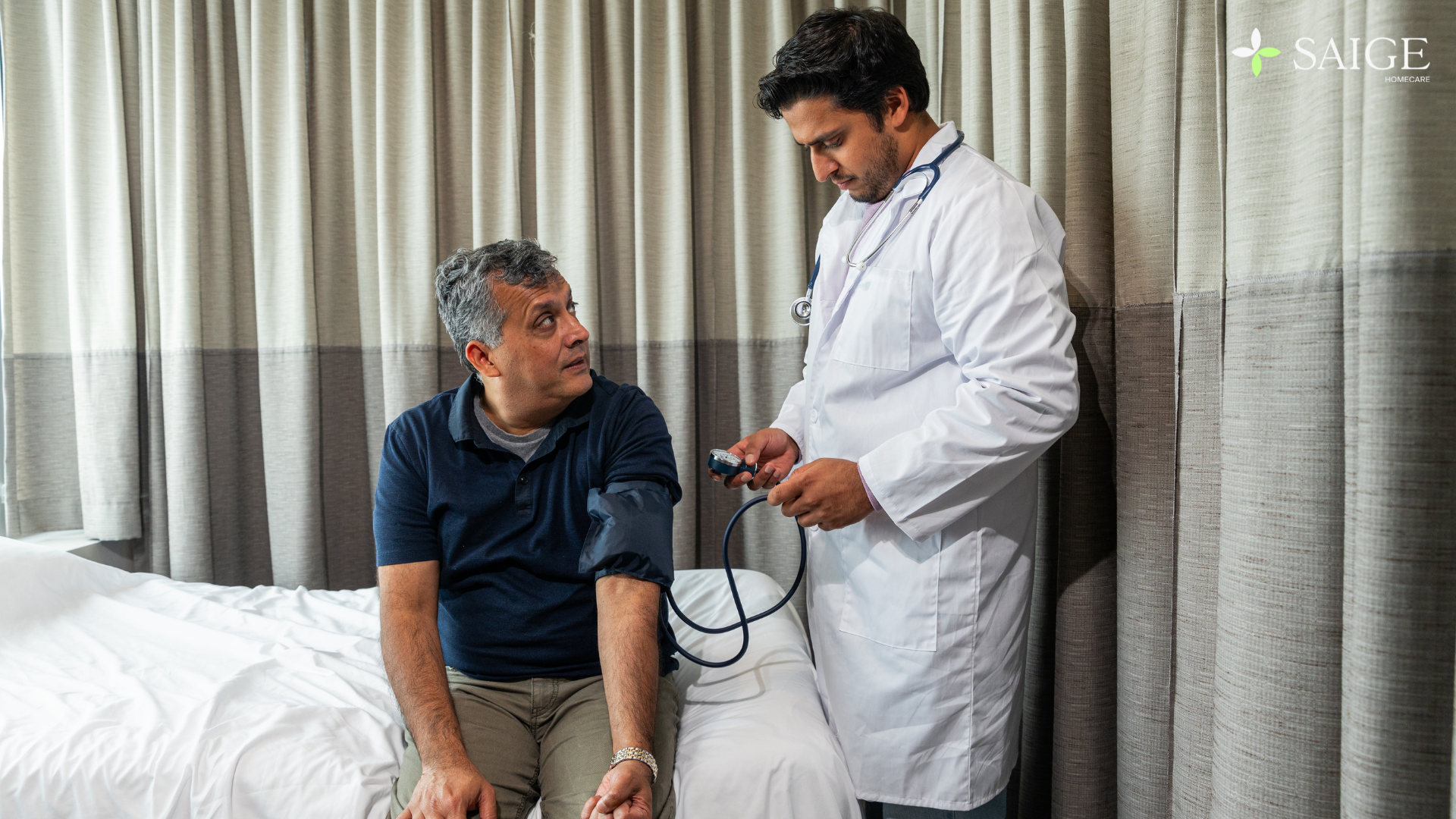Transitioning a loved one to professional elder care is a profound and sensitive decision. It marks a critical phase in their lives. It’s where personal care and professional support meet, shaping the twilight years of our seniors. In this article, you will learn:
- Key signs that show the need for professional elder care.
- The role of cognitive and physical health in independent living.
- Ways to ensure dignity and a good quality of life through professional care.
Let’s look at the signs that suggest it’s time for professional elder care. This ensures our loved ones get the caring support they deserve in their own home.
Signs Indicating the Need for Increased Care
The table below provides a concise summary of ten key signs that may indicate the need for professional elder care. For each sign, it offers a quick description of the issue, outlines common symptoms or behaviors associated with it, and highlights potential risks that may arise if the sign is ignored. This table serves as a useful reference guide for individuals and families who are assessing the well-being of their elderly loved ones and considering the importance of seeking appropriate care and support when needed.
| Sign | Quick Description | Symptoms | Potential Risks if Ignored |
| 1. Changes in Physical Health | Decline in mobility and health due to inactivity. | Difficulty walking, unexplained weight loss, frequent falls. | Increased risk of falls and injuries. |
| 2. Cognitive Decline | Memory loss, confusion, difficulty following instructions. | Forgetting recent events, repeating questions, getting lost. | Progression to severe dementia. |
| 3. Neglecting Personal Hygiene | Decrease in maintaining personal hygiene. | Infrequent bathing, strong body odor, unkempt appearance. | Health complications, skin infections. |
| 4. Increased Dependency | Growing need for assistance in daily activities. | Reliance on others for cooking, cleaning, transportation. | Caregiver burnout, reduced quality of life. |
| 5. Social Withdrawal or Isolation | Reduced social engagement and withdrawal from activities. | Avoiding social gatherings, loss of interest in hobbies. | Loneliness, depression, cognitive decline. |
| 6. Erratic or Forgetful Behavior | Misplacing items, forgetting medications, financial mismanagement. | Losing personal items, missed medication doses, unpaid bills. | Medication errors, financial issues. |
| 7. Safety Concerns | Increased accidents and hazards at home. | Frequent spills, unexplained injuries, kitchen accidents. | Serious injuries, health emergencies. |
| 8. Emotional or Behavioral Changes | Shifts in mood, agitation, withdrawal. | Mood swings, irritability, suspicion, agitation. | Mental health deterioration. |
| 9. Lack of Proper Nutrition | Poor diet, weight loss, difficulty in meal preparation. | Skipping meals, weight loss, expired food in home. | Malnutrition, worsened health conditions. |
| 10. Caregiver Burnout | Stress and exhaustion in family caregivers. | Feeling overwhelmed, constant fatigue, irritability. | Mistakes in care, caregiver’s health issues. |
1. Changes in Physical Health
The physical well-being of our seniors is a key indicator of their ability to live independently. Small changes, like less mobility, weight changes, or frequent falls, are important. These can show the need for professional elder care. Regular medical check-ups are vital. But, the watchful eyes of family members are just as important. They can notice these changes early and act quickly. This can lead to timely care through personal care services. This helps maintain the best living standards.
2. Cognitive Decline
Mental health is as important as physical health, especially for seniors at home or in assisted living. Early signs like memory issues, confusion, or disorientation need attention. These can be early signs of cognitive problems, like dementia. In these cases, getting help from professional home health aides or a geriatric care manager is key. Their skills not only keep your loved one safe. They also improve their quality of life. This includes making sure they take their medicine and providing a supportive living environment.
3. Neglecting Personal Hygiene
A clear drop in personal hygiene can be a big sign that elder care is needed. Struggling with daily self-care routines might come from physical or cognitive challenges. Professional care providers, like home health aides, are trained to help with these tasks. They do this with respect and empathy. This maintains dignity and health, and includes household chores. It lets seniors stay in the comfort and familiarity of their homes.
4. Increased Dependency
Requiring more assistance with basic needs indicates that living alone is becoming more challenging. This can include transportation, household management, or financial matters. Professional care services can provide valuable assistance in such situations. They allow seniors to maintain as much independence as possible while providing peace of mind to family members.
5. Social Withdrawal or Isolation
Withdrawing from social activities can lead to loneliness. This affects emotional and mental health.Eldercare professionals can play a crucial role in preventing this. They encourage social activities and involvement in the community. This ensures that daily interactions and meals are a meaningful part of life for seniors.
6. Erratic or Forgetful Behavior
Changes in behavior, like forgetfulness, losing things, or mismanaging money, can be early signs of cognitive issues. Professional home care services can address these symptoms. They provide a structured and stress-free environment. This ensures a peaceful living space.
7. Safety Concerns
Home safety is crucial. Repeated accidents, not taking medicine correctly, or not keeping a clean living space are clear signs that more help is needed. Professional caregivers can create a safe living environment. They manage medicine routines and provide careful supervision and care.
8. Emotional or Behavioral Changes
Big changes in mood or behavior might show health issues or be a reaction to aging. Professional elder care offers emotional support and respite care. They make sure any health issues, like needing physical therapy, are addressed quickly.
9. Lack of Proper Nutrition
Good nutrition is vital for health, especially for the elderly. Signs of poor nutrition, weight loss, or not wanting to eat show the need for professional help. Home care providers can assist with meal planning and preparation. They make meals enjoyable and nutritious.
10. Caregiver Burnout
Caring for an elderly family member is rewarding but hard. It’s important to recognize signs of caregiver stress. Professional care can provide needed support. This includes respite care services and home care assistance. It lets the family focus on emotional care, making sure seniors live their golden years with dignity and joy.
Conclusion
Recognizing the signs that an elderly loved one might need professional care is a key first step. It protects their health, safety, and happiness. This decision comes from careful observation, clear conversations, and compassion. Noticing these ten signs and using tools like eldercare locators helps families make smart choices about getting professional help. Options like long-term care insurance, talking to social workers, and involving healthcare experts can make this change easier. They bring comfort and reassurance to everyone involved. They were thinking about this important choice, resources like ‘The Comprehensive Guide to Elder Care Options’ offer more insight and advice. They light the way with knowledge and understanding.
Frequently Asked Questions
The signs include changes in physical health, cognitive decline, neglecting personal hygiene, increased dependency, social withdrawal, erratic behavior, safety concerns, emotional changes, lack of proper nutrition, and caregiver burnout.
Look for signs like memory lapses, confusion, disorientation, forgetfulness, or financial mismanagement. These may indicate cognitive impairments such as dementia.
Consider professional elder care providers like home health aides or personal care assistants who are trained to support daily self-care routines with empathy and respect.
Professional caregivers can create a secure living environment, manage medication routines, and provide vigilant supervision to ensure the safety of seniors.
Eldercare professionals can encourage participation in social activities, foster community connections, and make daily interactions more meaningful.


